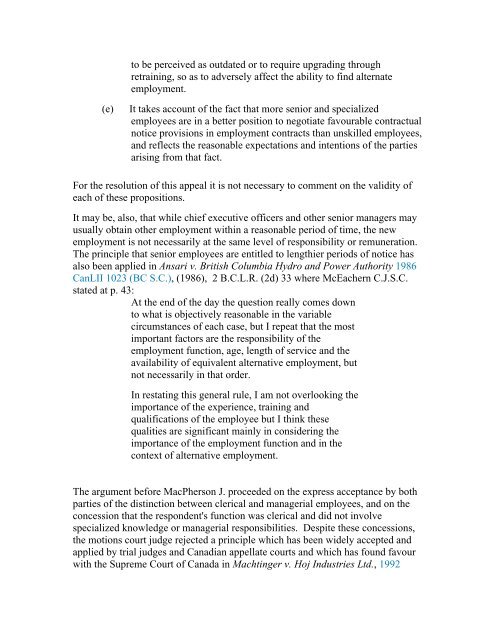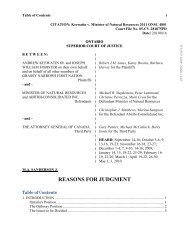Cronk v. Canadian General Insurance Co., 1995 CanLII 814 (ON CA)
Cronk v. Canadian General Insurance Co., 1995 CanLII 814 (ON CA)
Cronk v. Canadian General Insurance Co., 1995 CanLII 814 (ON CA)
You also want an ePaper? Increase the reach of your titles
YUMPU automatically turns print PDFs into web optimized ePapers that Google loves.
to be perceived as outdated or to require upgrading through<br />
retraining, so as to adversely affect the ability to find alternate<br />
employment.<br />
(e)<br />
It takes account of the fact that more senior and specialized<br />
employees are in a better position to negotiate favourable contractual<br />
notice provisions in employment contracts than unskilled employees,<br />
and reflects the reasonable expectations and intentions of the parties<br />
arising from that fact.<br />
For the resolution of this appeal it is not necessary to comment on the validity of<br />
each of these propositions.<br />
It may be, also, that while chief executive officers and other senior managers may<br />
usually obtain other employment within a reasonable period of time, the new<br />
employment is not necessarily at the same level of responsibility or remuneration.<br />
The principle that senior employees are entitled to lengthier periods of notice has<br />
also been applied in Ansari v. British <strong>Co</strong>lumbia Hydro and Power Authority 1986<br />
<strong>CanLII</strong> 1023 (BC S.C.), (1986), 2 B.C.L.R. (2d) 33 where McEachern C.J.S.C.<br />
stated at p. 43:<br />
At the end of the day the question really comes down<br />
to what is objectively reasonable in the variable<br />
circumstances of each case, but I repeat that the most<br />
important factors are the responsibility of the<br />
employment function, age, length of service and the<br />
availability of equivalent alternative employment, but<br />
not necessarily in that order.<br />
In restating this general rule, I am not overlooking the<br />
importance of the experience, training and<br />
qualifications of the employee but I think these<br />
qualities are significant mainly in considering the<br />
importance of the employment function and in the<br />
context of alternative employment.<br />
The argument before MacPherson J. proceeded on the express acceptance by both<br />
parties of the distinction between clerical and managerial employees, and on the<br />
concession that the respondent's function was clerical and did not involve<br />
specialized knowledge or managerial responsibilities. Despite these concessions,<br />
the motions court judge rejected a principle which has been widely accepted and<br />
applied by trial judges and <strong>Canadian</strong> appellate courts and which has found favour<br />
with the Supreme <strong>Co</strong>urt of Canada in Machtinger v. Hoj Industries Ltd., 1992
















